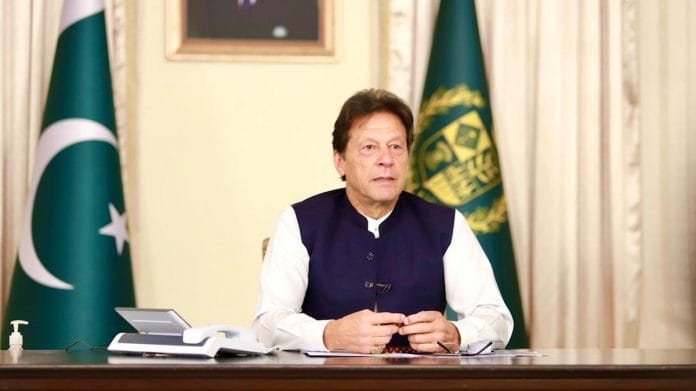Pakistan-occupied Kashmir underwent the 11th general election recently, and Prime Minister Imran Khan-led Pakistan Tehreek-e-Insaf emerged victorious. It has become a tradition of sorts — the party in power in Islamabad wins the election in PoK. The contest was between the three mainstream parties Pakistan Muslim League (Nawaz), PTI, and Pakistan Peoples Party. Pro-independence parties are not allowed to participate in elections.
The campaigning saw heated debates. While a PTI representative dubbed Z.A. Bhutto as a traitor, the sharpest exchange took place between PML (N)’s Maryam Nawaz and PM Imran Khan. The PML (N) leader accused Khan of planning to make PoK a province of Pakistan. Although the PM denied the charge, his answer did not close the option for a change of status quo.
The farce of elections in PoK…
These heated exchanges may signify much ado about nothing. In a democracy, elections result in governance by the elected legislature and executive. But in PoK, both are powerless.
The 1974 ‘interim constitution’ of PoK vested all legislative powers into the hands of the Council headed by Pakistan’s prime minister. The elected legislature was left with undefined, residuary powers. The PoK government’s powers are limited to the extent of its legislative authority, and largely confined to municipal functions. This means a rule, by proxy, by Islamabad. Under the 13th amendment of PoK’s constitution in 2018, the Council was relegated to an advisory role. But instead of transferring its powers to the elected assembly, Pakistan has assumed them directly. It exercises legislative powers over 22 subjects within PoK. The assembly needs Islamabad’s approval even on the remaining 32 subjects it is allowed to legislate on. This makes PoK’s position worse than Pakistani provinces, which have the freedom to legislate, at least in areas within their jurisdiction.
Maryam Nawaz said the PM wanted to take away PoK’s identity by making it a province. Her defense of PoK’s ‘azad’ status drew applause from the audience. Apparently, the ‘independence’ sentiment there remains strong. While denying the charge, PM Khan said his government was committed to a referendum in accordance with UN resolutions. He promised that once PoK joins Pakistan, there will be a second referendum to determine whether its population wants to stay with Pakistan or become independent. This was a bow to the strength of the ‘independence’ option. The two politicians at the opposite ends of the political spectrum were trying to tap into the sentiment for ‘Azadi’. Kashmir’s accession to Pakistan is popular in that country, not necessarily in PoK.
If POK is not allowed to exercise ‘independence’ option when it is notionally ‘Azad’, it will have even less freedom to do so once it becomes legally a part of Pakistan. If the PM is serious about his offer, the starting point should be to allow pro-independence parties to take part in elections. Why did he bring up the question of the referendum? He could have simply said that there would be no change in the status of PoK. For nearly two years now, Pakistan’s establishment has been thinking of responding to India’s abrogation of Article 370. PM Khan had offered ‘provisional provincial status’ to Gilgit-Baltistan in November 2020, though this has not been followed up with concrete action.
Also read: Pro-India Kashmiris more or less hated here, but Delhi won’t hear the truth: Farooq Abdullah
And its history…
The election process in PoK has a checkered history.
First elections, on the basis of the universal franchise, were held in PoK in 1970. This was more than two decades after the territory was illegally occupied by Pakistan. Till then, it was run on the basis of Rules of Business by the Ministry of Kashmir Affairs and the Northern Areas. Under Zia-ul-Haq, there were no elections in PoK for eight years. When they did take place in 1985, political parties were not allowed to participate in the elections and candidates had to contest in their individual capacity. The Jammu Kashmir Liberation Front, which was used to stir trouble in J&K, is barred from contesting elections under PoK’s constitution.
The assembly has 53 seats, including 33 general, 12 refugee, and eight reserved seats for women. Out of the 45 seats representing the first two categories, PTI has won 25, PPP 11, and PML (N) six. The smaller splinter groups won 1 seat each. Reserved seats do not affect the balance; they are divided amongst the winners in proportion to their performance in the general constituency. The pattern that the party in power invariably wins the election in PoK is built into the electoral structure. The 12 refugee seats represent refugees from the Kashmir Valley and Jammu. Scattered all over Pakistan in small numbers, the election outcome of these seats can be easily manipulated by the Federal or provincial government concerned. PTI has won nine out of these 12 seats. The party had secured 16 out of the 33 general seats, which is below the simple majority required to form the government. But with its tally of nine refugee seats, it now has a comfortable majority of 25.
There is hardly any regional party left in PoK to voice the aspirations of its people. This may not be a coincidence. PoK’s constitution discourages ‘parochial’ tendencies. The Muslim League leadership was averse to ethnic or regional identities since the creation of Pakistan. After the emergence of Bangladesh, the tendency became stronger and is now enshrined in PoK’s constitution. There is no space for ‘Kashmiriyat’ in ‘Azad Jammu and Kashmir’.
D.P. Srivastava is former Ambassador and author of The Forgotten Kashmir: The Other Side of the Line of Control. Views are personal.
(Edited by Anurag Chaubey)






